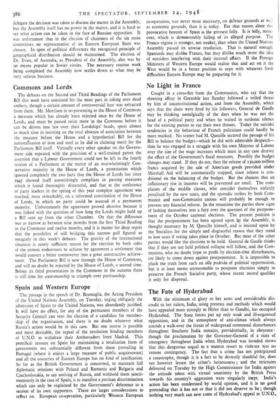No Light in France Caught in a cross-fire from the
Communists, who say that the shooting affray in Grenoble last Sunday followed a veiled threat by him of unconstitutional action, and from the Assembly, which says that the shots were fired by his followers, General de Gaulle may be thinking nostalgically of the days when he was not the head of a political party and when he waited in sardonic silence for the existing parties to cut their own throats. Today the suicidal tendencies in the behaviour of French politicians could hardly be more marked. No sooner had M. Queuille secured the passage of his Bill to balance the budget—which he did with admirable *despatch— than he was engaged in a struggle with his own Minister of Labour over the size of the wage increases which must in any case destroy the effect of the Government's fiscal measures. Possibly the budget changes may stand. If they do not, then the release of 130,000 million francs acquired by the sale of American goods provided Mader Marshall Aid will be automatically stopped, since release is con- ditional on the balancing of the budget. But the chances that an inflationary rise in incomes will be prevented are small. The com- plaints of the middle classes, who consider themselves unfairly penalised by the new taxes, and the sporadic strikes by both Com- munist and non-Communist unions will probably be enough to prevent any financial reform. In the meantime the parties show signs of lashing themselves into a fury over the question of the postpone- ment of the October cantonal elections. The present position is that the postponement has been agreed upon lay the Assembly, is thought necessary by M. Queuille himself, and is insisted upon by the Socialists for the simple and disgraceful reason that they stand to lose seats if voting takes place in October. But most of the other parties would like the elections to be held. General de Gaulle thinks that if they are not held political collapse will follow, and the Com- munists, who no doubt hope to profit by election-time disturbances, are likely to come down against postponement. It is impossible to pluck the truth from such an die podritia of political opportunism, but it at least seems unreasonable to postpone elections simply to preserve the French Socialist party, whose recent record qualifies it only for dispersal.


































 Previous page
Previous page